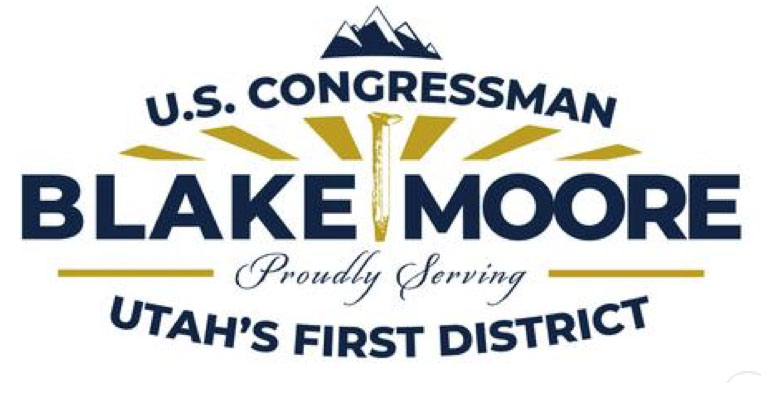U.S. Rep. Blake Moore (R-Dist. 1) has released the recommendations of a Debt and Deficit Task Force to curb runaway federal spending.
OGDEN – A Debt and Deficit Task Force has released its 2022 recommendations for ways to address the nation’s growing financial crisis.
“I am deeply concerned about our country’s debt and deficit crisis,” said U.S. Rep. Blake Moore (R-Dist. 1), who organized the task force. “I want to use my role in Congress to improve our national fiscal outlook for the next generation.”
The task force is comprised of industry leaders from Utah’s first Congressional district.
“They offer a wide array of experience to bring Utah’s values and principles to the conversation on how we can reverse our national debt crisis,” according to Moore.
The members of the Debt and Deficit Task Force include John Boyer, president of the J.E. Boyer Company; Gordon Larsen, senior advisor for Federal Affairs in the office of Gov. Spencer J. Cox; Utah economist Natalie Gochnour; Kerry Wahlen, president of Goldenwest Credit Union; Chip Nelson, former president of Woodside Homes; Pat Condon, former commander of the Ogden Air Logistics Center; physician Dr. J. David Schmitz; Greg Poulsen, chief strategy officer, Intermountain Healthcare; attorney Blake Wade; and, Richard Hendrickson, president of Lifetime Products.
In early 2022, Moore said, the U.S. gross national debt surpassed $30 trillion. Ten years ago, that figure stood at $15.2 trillion.
Our debt has doubled over the past 10 years, while Gross Domestic Product has only increased by 50 percent to $23 trillion.
“Without correction,” he added, “our nation will be ill-equipped to confront the next domestic challenge or foreign conflict.
“It will be less likely to pay back its debt and its risk of default is significantly higher, jeopardizing the U.S. dollar’s global reserve status … Last year, inflation rose more in a single year than in any 12-month period since 1982.
“At the gas pump and at the grocery store, hardworking American families are struggling with unprecedented prices,” Moore concluded.
The task force’s 2022 recommendations focus on growing the economy; saving and strengthening vital programs, including healthcare and social security; focusing America’s spending; and, fixing Congress’s budget process.
The American economy is far from a picture of health. The task force’s members say we ought to have a higher labor force participation rate and get our inflation under control.
We must play defense against Democrats’ proposals that would only hamper our economy, they say. If President Joe Biden’s “Build Back Better” agenda and his Fiscal Year 2023 budget proposal were made law, our nation would have the highest tax rates for both corporations and individuals in the developed world.
The task force believes we must ensure that we are incentivizing individuals to join or rejoin the workforce by avoiding flawed unemployment benefits and unnecessary subsides. By working to reverse these trends, the task force says that we can add to Gross Domestic Product, add to the federal revenues and improve our debt-to-GDP ratio.
The D&D Task Force also supports tax cuts for individuals, families and small businesses; legislation that blocks the executive branch from barring energy production on federal land; and Moore’s efforts to ensure that the Department of the Interior does not drag its feet on approving permits to drill so domestic energy can be unleashed.
In 1970, the task force said, mandatory spending constituted 31 percent of the entire federal budget. In 2022, it is projected to cover a frightening 65 percent.
Medicare spending grew 3.5 percent in 2020 to $829.5 billion and Medicaid spent grew by 9.2 percent to $671.2 billion. As things stand currently, doctors and nurses spend huge portions of their days on billing paperwork rather than caring for those in need.
The task force said that we need to take steps to streamline that billing process.
Social Security trustees report that funding reserves will be depleted by 2033.
The task force members say that increasing already-high Social Security taxes will only increase uncertainty and inter-generational redistribution of wealth without increasing growth.
Instead, they say, we could strengthen the program by adjusting the eligibility age and tying cost of living adjustments to indexes of inflation.
Congress is addicted to spending. After authorizing around $4.5 trillion in response to the pandemic, Democrats still proposed spending up to $3.5 trillion more on the abortive “Build Back Better” program.
The members of the task force endorse the findings of the Republican Study Committee identifying a multitude of potential federal programs to cap or eliminate and other improvements to limit discretionary spending.
Congress has clearly never had to reevaluate it budget process. Instead of foster success, our system fosters disorder.
Rather than creating an arbitrary debt ceiling, the task force recommends, we should tie our ability to spend to our nation’s economic health.
This would incentivize us to prioritize our economic health as we develop budget and help to curb our spending addiction.
The full text of the Debt and Deficit Task Force recommendations can be found at https://blakemoore.house.gov/media/press-releases/congressman-blake-moore-releases-debt-and-deficit-task-forces-2022.
“I look forward to sharing these recommendations with my colleagues in Washington,” Moore said, “as we push for reforms in our federal spending processes so we can balance America’s checkbook and get us back on a fiscally sustainable path.”
The task force recommendations were released on April 22, one day prior to the GOP nominating convention where state delegates appeared to give Moore a vote of no confidence.
After three rounds of balloting, former civilian intelligence officer Andrew Badger narrowly missed capturing the nomination with 59.2 percent of the ballots cast as opposed to Moore’s 40.7 percent.
Moore will now face off against Badger and former Morgan County commissioner Tina Cannon in the June 28 Republican primary voting.
Cannon had already secured a spot on the primary ballot by collecting voter signatures.

